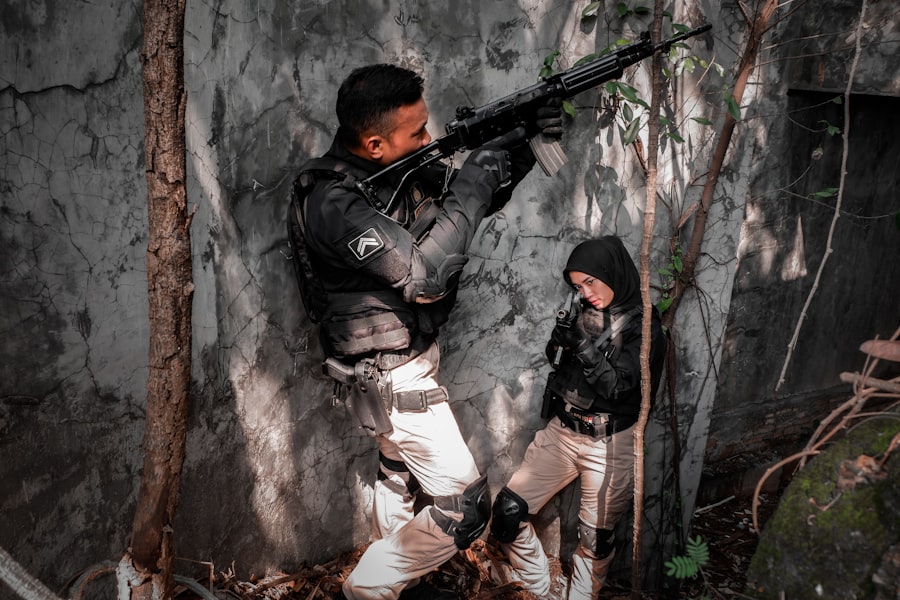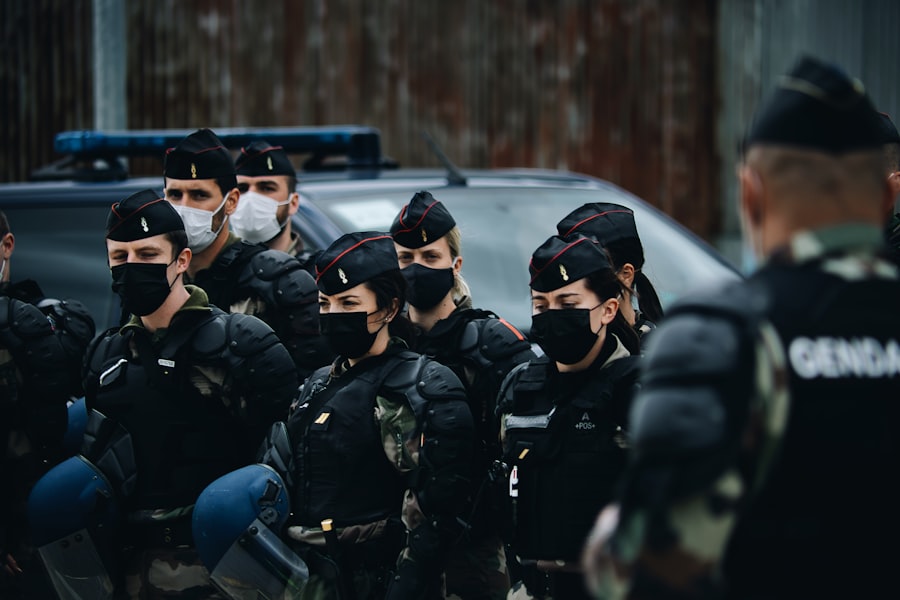The roots of mercenary warfare in Africa can be traced back to ancient times when various tribes and kingdoms employed foreign warriors to bolster their military capabilities. These early mercenaries were often drawn from neighboring regions or distant lands, motivated by the promise of wealth, land, or prestige. As African societies evolved, so too did the nature of warfare, leading to a more organized and systematic use of mercenaries.
The rise of powerful empires, such as the Mali and Songhai empires, saw the incorporation of mercenary forces into their armies, reflecting a growing recognition of the strategic advantages that these hired soldiers could provide. By the time European colonial powers began to carve up the continent in the late 19th century, mercenary warfare had become a well-established practice. Colonial administrations often relied on mercenaries to suppress local uprisings and maintain control over vast territories.
This reliance on foreign fighters not only highlighted the limitations of colonial forces but also set a precedent for the use of mercenaries in subsequent conflicts across Africa. The complex interplay between indigenous military traditions and external influences laid the groundwork for a mercenary culture that would persist throughout the continent’s tumultuous history.
Key Takeaways
- Mercenary warfare in Africa has deep historical roots, evolving from colonial times through post-colonial conflicts.
- Cold War dynamics significantly intensified mercenary involvement in African political and military struggles.
- Mercenaries have been closely linked to resource extraction, often exacerbating conflicts and instability.
- The rise of private military companies marks a modern shift in mercenary activity, influencing contemporary African conflicts.
- Legal and ethical challenges persist regarding mercenary use, impacting African societies and their political landscapes.
The Role of Mercenaries in Colonial Africa
During the colonial era, mercenaries played a pivotal role in maintaining the dominance of European powers over African territories. Colonial governments frequently employed mercenary forces to quell resistance movements and enforce their rule. These hired soldiers were often more effective than regular troops, as they were motivated by financial incentives rather than loyalty to a colonial power.
This dynamic allowed colonial administrations to deploy mercenaries in situations where local knowledge and adaptability were crucial for success. Moreover, mercenaries were instrumental in shaping the political landscape of colonial Africa. Their involvement in conflicts often exacerbated tensions between different ethnic groups, as rival factions sought to hire their own mercenaries to gain an advantage.
This practice not only fueled violence but also contributed to the fragmentation of societies, as communities became increasingly polarized along ethnic lines. The legacy of these mercenary activities would have lasting implications for post-colonial Africa, where many nations struggled to reconcile their diverse populations in the aftermath of colonial rule.
Mercenaries in Post-Colonial Africa: From Decolonization to Civil Wars

The wave of decolonization that swept across Africa in the mid-20th century brought about significant changes in the role of mercenaries on the continent. As newly independent nations emerged, many faced internal strife and power struggles that often led to civil wars.
The chaotic political landscape created fertile ground for mercenary activity, as both domestic and foreign actors sought to exploit the instability for their own ends. In several instances, mercenaries were directly involved in coups and regime changes, further complicating the political situation in post-colonial Africa. For example, the infamous mercenary Bob Denard played a significant role in multiple coups in countries like the Comoros and Angola during the 1970s and 1980s.
His actions exemplified how mercenaries could influence national politics and contribute to ongoing cycles of violence. As civil wars raged across the continent, the presence of mercenaries often prolonged conflicts and hindered efforts toward reconciliation and stability.
The Influence of Cold War Politics on Mercenary Activity in Africa
| Year | Region in Africa | Major Cold War Influence | Mercenary Activity Level | Notable Mercenary Groups | Impact on Local Conflicts |
|---|---|---|---|---|---|
| 1960-1965 | Congo (Katanga) | US and USSR support opposing factions | High | White Legion, 5 Commando | Prolonged secessionist conflict, increased violence |
| 1970-1975 | Angola | Proxy war between Soviet-backed MPLA and US-backed FNLA/UNITA | Very High | Executive Outcomes, South African mercenaries | Escalation of civil war, foreign intervention |
| 1980-1985 | Rhodesia (Zimbabwe) | Cold War tensions influencing liberation movements | Moderate | Selous Scouts (paramilitary), foreign mercenaries | Increased guerrilla warfare, destabilization |
| 1990-1995 | Sierra Leone | Post-Cold War power vacuum, residual Cold War alliances | High | Executive Outcomes | Temporary stabilization followed by renewed conflict |
| 1995-2000 | Democratic Republic of Congo | Regional conflicts influenced by Cold War-era alliances | High | Various mercenary factions | Prolonged civil war, foreign mercenary involvement |
The Cold War era had a profound impact on mercenary activity in Africa, as superpowers sought to expand their influence on the continent through proxy wars and support for various factions. Mercenaries became valuable assets for both Western and Eastern blocs, who often funded and equipped them to fight on behalf of their ideological allies. This geopolitical context created an environment where mercenary forces could thrive, as they were seen as a means to achieve strategic objectives without direct military intervention.
The involvement of mercenaries in Cold War conflicts often blurred the lines between national interests and private gain. For instance, during the Angolan Civil War, mercenaries from various countries were recruited by both sides, leading to a complex web of alliances and enmities that further complicated an already volatile situation. The Cold War not only legitimized the use of mercenaries but also contributed to a culture of violence that would have lasting repercussions for African nations long after the ideological struggle between superpowers had ended.
Mercenaries and Resource Extraction in Africa
The intersection of mercenary activity and resource extraction has been a defining feature of many conflicts in Africa. As multinational corporations sought to exploit the continent’s vast natural resources, they often turned to private military contractors and mercenaries to protect their interests. This relationship between business and warfare created a lucrative market for mercenaries, who could provide security services in exchange for substantial financial rewards.
In countries rich in resources but plagued by instability, such as Sierra Leone and the Democratic Republic of Congo, mercenaries have played a critical role in securing mining operations and oil fields. Their presence has often exacerbated existing tensions, as local communities have found themselves caught between competing interests—those seeking to extract wealth from their land and those hired to protect those interests. This dynamic has led to increased violence and human rights abuses, as mercenaries prioritize profit over the well-being of local populations.
The Impact of Mercenaries on African Societies and Politics

The influence of mercenaries on African societies extends beyond mere military engagement; it has profound implications for political structures and social cohesion. The presence of hired soldiers can undermine state authority, as governments may rely on external forces rather than building robust national armies capable of maintaining order. This reliance can erode public trust in state institutions and contribute to a sense of insecurity among citizens.
Furthermore, mercenary activity can exacerbate existing social divisions within communities. As different factions hire their own mercenaries, conflicts can become increasingly polarized along ethnic or political lines. This fragmentation can hinder efforts toward national unity and reconciliation, perpetuating cycles of violence that are difficult to break.
The long-term consequences of this dynamic can be seen in many African nations today, where the legacy of mercenary involvement continues to shape political discourse and societal relations.
The Legality and Ethics of Mercenary Activity in Africa
The legality and ethics surrounding mercenary activity in Africa remain contentious issues that provoke debate among scholars, policymakers, and human rights advocates. While international law prohibits the recruitment and use of mercenaries, enforcement remains challenging due to varying interpretations and lack of consensus among nations. Many African countries have struggled to regulate private military companies effectively, leading to a proliferation of unaccountable actors operating within their borders.
Ethically, the use of mercenaries raises questions about accountability and responsibility for human rights violations. Mercenaries often operate in grey areas where legal frameworks are weak or nonexistent, making it difficult to hold them accountable for their actions. This lack of oversight can lead to abuses that disproportionately affect vulnerable populations caught in conflict zones.
As African nations grapple with these challenges, there is an urgent need for comprehensive legal frameworks that address the complexities of modern warfare while safeguarding human rights.
The Rise of Private Military Companies in Africa
In recent years, there has been a notable rise in private military companies (PMCs) operating across Africa. These entities offer a range of services, from security provision to logistical support, often filling gaps left by under-resourced national armies. The emergence of PMCs reflects broader trends in globalization and privatization within the defense sector, as states increasingly turn to private actors to fulfill military needs.
The proliferation of PMCs has significant implications for conflict dynamics in Africa. While they can provide essential services that enhance security and stability, their presence also raises concerns about accountability and transparency. The blurred lines between state actors and private contractors can complicate efforts to establish clear lines of responsibility during conflicts.
As PMCs continue to expand their operations on the continent, it is crucial for African governments to develop regulatory frameworks that ensure these companies operate within legal and ethical boundaries.
Mercenaries in Modern African Conflicts: From Sierra Leone to Libya
Modern African conflicts have seen a resurgence of mercenary activity, with notable examples including Sierra Leone’s civil war and Libya’s ongoing turmoil. In Sierra Leone, the brutal conflict that erupted in the 1990s saw various factions employing mercenaries to bolster their ranks amid widespread violence and human rights abuses. The involvement of foreign fighters not only intensified hostilities but also complicated peace efforts as different groups vied for control over territory and resources.
Similarly, Libya’s descent into chaos following the 2011 uprising against Muammar Gaddafi has been marked by significant mercenary involvement. Various factions have recruited foreign fighters—some motivated by ideology while others seek financial gain—to support their causes. This influx of mercenaries has contributed to a fragmented political landscape where competing interests clash violently, further destabilizing an already fragile nation.
The experiences from these conflicts underscore the enduring relevance of mercenaries in shaping contemporary African warfare.
The Future of Mercenary Warfare in Africa
As Africa continues to grapple with complex security challenges, the future of mercenary warfare on the continent remains uncertain. Factors such as ongoing political instability, resource competition, and external influences will likely shape the landscape for years to come. While some argue that PMCs could provide necessary support for national armies struggling with capacity issues, others caution against the potential risks associated with unregulated private military involvement.
The evolution of technology also plays a crucial role in shaping future conflicts involving mercenaries.
As African nations navigate these challenges, it will be essential for them to develop comprehensive strategies that address both security needs and ethical considerations surrounding mercenary activity.
The Legacy of Mercenaries in African History
The legacy of mercenaries in African history is complex and multifaceted, reflecting broader themes of power, conflict, and societal change. From their origins in ancient warfare to their contemporary roles in modern conflicts, mercenaries have played a significant part in shaping the continent’s political landscape. Their involvement has often exacerbated existing tensions while complicating efforts toward peace and reconciliation.
As Africa moves forward into an uncertain future marked by ongoing challenges related to governance and security, understanding the historical context surrounding mercenary activity will be crucial for addressing contemporary issues. By learning from past experiences and developing robust legal frameworks that prioritize accountability and human rights, African nations can work toward creating a more stable environment free from the cycles of violence perpetuated by mercenary involvement. Ultimately, acknowledging this legacy is essential for fostering a more peaceful future on the continent.
The history of mercenaries in Africa is a complex and often tumultuous subject, reflecting the continent’s struggles with colonialism, conflict, and power dynamics. For a deeper understanding of this topic, you can explore the article on mercenaries and their impact on African conflicts at In the War Room. This resource provides valuable insights into the role of private military contractors and the implications of their involvement in various African nations throughout history.
WATCH THIS! The Secret War for Africa’s Gold: How Private Armies Fund Global Conflict
FAQs
What is the history of mercenaries in Africa?
Mercenaries have been involved in African conflicts for centuries, often hired by local rulers, colonial powers, or private interests to fight in wars or protect territories. Their roles have evolved from early tribal conflicts to involvement in colonial conquests and post-independence civil wars.
When did mercenary activity begin in Africa?
Mercenary activity in Africa dates back to pre-colonial times when warriors were hired by different tribes or kingdoms. However, it became more prominent during the colonial era in the 19th and 20th centuries, as European powers employed mercenaries to expand and maintain their control.
What roles did mercenaries play during the colonial period in Africa?
During the colonial period, mercenaries were often used as soldiers, military advisors, or enforcers by European colonial powers. They helped suppress local resistance, secure territories, and sometimes acted as private armies for colonial companies.
How did mercenaries influence post-independence conflicts in Africa?
After African countries gained independence, mercenaries were frequently hired by governments or rebel groups to fight in civil wars, coups, and border disputes. Their involvement sometimes prolonged conflicts and complicated peace efforts.
Are mercenaries in Africa regulated by international law?
International law, including the United Nations Mercenary Convention, seeks to regulate mercenary activity, but enforcement is challenging. Many African countries have laws against mercenary activities, but illegal recruitment and use of mercenaries persist.
What are some notable examples of mercenary involvement in African conflicts?
Notable examples include mercenaries in the Congo Crisis (1960s), the Angolan Civil War, and the Sierra Leone Civil War. These mercenaries were often foreign nationals hired to support various factions.
How has the perception of mercenaries in Africa changed over time?
Perceptions have shifted from viewing mercenaries as necessary military assets to seeing them as destabilizing forces or “soldiers of fortune.” Today, private military companies have largely replaced traditional mercenaries, raising new ethical and legal questions.
What is the difference between mercenaries and private military companies (PMCs) in Africa?
Mercenaries are individual soldiers hired for combat without allegiance to a nation, often operating illegally. PMCs are organized companies providing military services, sometimes legally contracted by governments or corporations, though their activities can overlap with mercenary work.
Why do African conflicts attract mercenaries?
Factors include political instability, resource wealth, weak governance, and ongoing conflicts. Mercenaries are attracted by financial gain, ideological reasons, or the opportunity to gain combat experience.
What impact have mercenaries had on African societies?
Mercenaries have contributed to prolonged conflicts, human rights abuses, and political instability in some cases. However, they have also been involved in training local forces and providing security in volatile regions.


